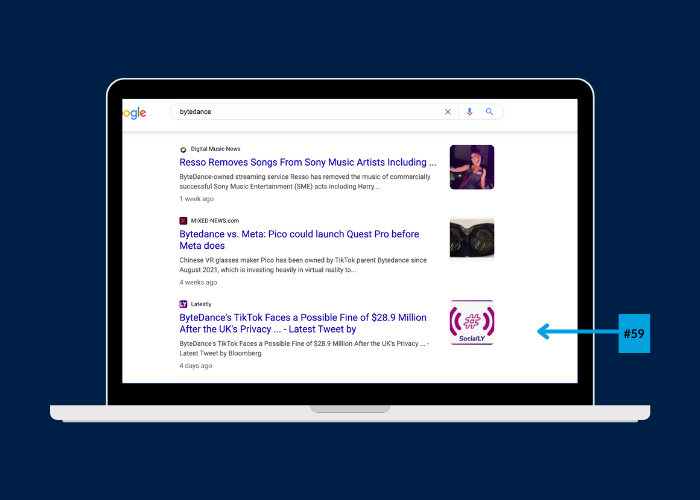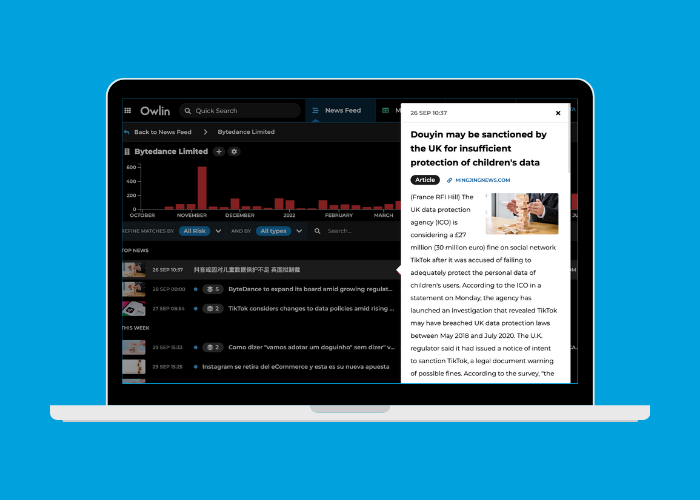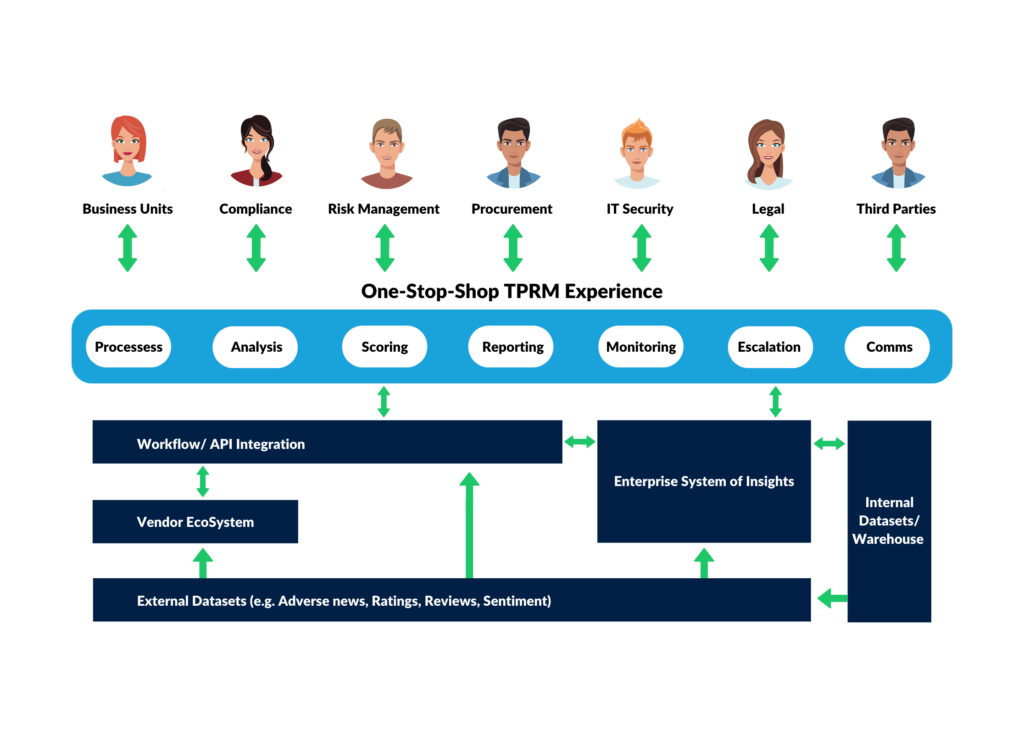Adverse media check? Why a Google Search isn’t enough
Estimated reading time: 6 minutes
We live in an interconnected world where millions of news articles are published daily in official and unofficial sources; it can take just a single one to cause financial or reputational damage. Moreover, the global news wire is often insufficient for monitoring adverse media for complex global vendor networks.
What is Adverse Media Monitoring?
First, let’s look at what adverse media monitoring exactly is. At Owlin, we define adverse media monitoring (sometimes called negative news monitoring or negative media monitoring) as the process in which a person or entity is screened for negative news in official and unofficial online sources. In the context of adverse media monitoring for business, signals that may be viewed as adverse media are:
- Customers complaining about the service of a company
- Articles in which board members or executives are accused of fraud
- News about a company having security issues (for example, a data leak)
- Articles in which a company is accused of not paying their suppliers
Businesses often look for adverse media about counterparties, clients, vendors, suppliers, competitors, and prospects (and themselves) across key risk themes (e.g., cyber, ESG, financial, regulatory) for various reasons. The common denominator, however, is that adverse media monitoring is carried out to avoid financial, environmental, reputational, or security risks. Therefore, adverse media monitoring is often essential to Third Party Risk Management, Counterparty Risk, and Merchant Monitoring.
But how do you monitor adverse news worldwide with a local focus? And why is Google Search an insufficient tool for this particular purpose?
Google search for Adverse Media Monitoring
Google dominates the worldwide search engine market with a market share of over 90% over other well-known alternatives like Bing, Yahoo, Baidu, and DuckDuckGo.
A quick round of questions to our prospects and clients learned that most use (or used) Google for adverse news checks. This doesn’t surprise us: Google is free, straightforward, and provides hundreds (or millions) of results within seconds, and for many use cases, a Google Search just makes sense, hence the popularity of the search engine.
However, if you want to monitor adverse media on a global scale, does Google Search offers you the optimal results? ‘No’ is the short answer, and if you want to know why keep reading for ten reasons why a Google search isn’t adequate for adverse media monitoring.
Ten reasons why a Google Search isn’t enough for adverse media monitoring
1. The issue of too wide vs. too narrow results
In essence, Google’s Search Engine algorithm attempts to give you the results you are looking for (sounds straightforward, right?). If you search for a supermarket on the Upper West Side, chances are high that you will find what you’re looking for. However, let’s examine what this might unveil when searching for adverse media.
The Google Search Engine will show you results based on your keywords. So, if you want to find out if customers are unhappy with the services of company ‘x’, this will mean you may be looking for the keywords ‘complaints + company name’. But what about the keywords ‘ bad review,’ ‘accusation,’ ‘charge,’ and ‘dissatisfaction’?
By searching for this combination of keywords, chances are high that you are ruling out different adjacent relevant search results. In other words: a Google search leaves you in a constant battle between too many results (broader keywords) and the potential of ruling out relevant results (by putting too many keywords together).
Of course, you could make use of Google Alerts. However, in the case of monitoring a portfolio with, say, 1000 entities, the number of alerts you receive will soon get untenable.
2. The issue of context
Let’s say you find one negative news article about a customer complaining about a company’s services. What does this tell you? Since a basic Google Search will not contextualize the results, it can be hard to put one negative news article in perspective. In other words: how bad is something you’re seeing? This depends on how much additional research you will do on Google.
For example, you must consider that you don’t know if Google will deduplicate search results when analyzing Google search results. This causes issues since the relative news volume matters in the case of adverse media.
3. The issue of reliability
While we all know that an article in an established newspaper such as The New York Times, Wall Street Journal, or Washington Post is most likely reliable, the internet is full of not-so-reliable content. Often it’s pretty hard to tell if something is relevant or reliable. For example, the ‘scam research’ business is thriving, and ambiguous claims frequently dominate the Google Search news sections.
4. The issue of language
Google’s Search Engine is designed so that the organic results you are seeing are the results Google presumes you want to see. So, when searching in Japanese for news about Starbucks employees complaining about the company, Google will provide you with search results in Japanese.
While it’s lovely that Google provides you with results in a language you’re able to read, it also limits your possibilities when searching for adverse media in other languages. Depending on the number of languages you speak and your ability to translate articles, Google Search will always limit your search possibilities simply because you stay in your language bubble.
5. The issue of location
Related to the issue of language is the subject of location. Since Google’s Engine is designed to show the most relevant search results, it considers your physical location. Most of the time, this will result in the relevant results you are looking for. While in other cases, it will not. So, just as with the issue of language, your location will create a bubble.
Fortunately, Google gives its users the option to change their search location. Furthermore, you could use a VPN to optimize your search results further. But again, this endeavor becomes more and more time-consuming and manual when monitoring the global news.
To illustrate issues 4 & 6, we took the following screenshots on September 30th (location New York City). The entity we googled was Bytedance (TikTok). Via Google Search, we did not immediately find out about a 28.9 million fine (by the UK government) the company faced after it was accused of failing to adequately protect the personal data of children’s users. In the first 100 Google Search results, it was mentioned only once. However, an Owlin quick search pointed us directly (via Top News) to the article written in Chinese.


6. The issue of search history
“When you search on Google with Web & App Activity turned on, Google saves activity like your Search history to your Google Account. We use your saved activity across Google services to give you more personalized experiences, like app and content recommendations.”
As stated by its Help Center, Google considers your previous search history. While this usually doesn’t cause concern, monitoring adverse news could be problematic. Fortunately, you could resolve this issue by turning Web & App Activity off and deleting your search history, which requires an extra (manual) action.
7. The issue of SEO
SEO stands for Search Engine Optimization. Essentially, it entails investments organizations make through technology, linkbuilding, and content to improve a website’s overall prioritization on the Google search results page. This is problematic for the use case of adverse news monitoring because the completeness of a search is more critical than the prioritization driven by how effectively an organization enables technology, linkbuidling, and content. Therefore, with a Google Search only, adverse media users risk missing important content due to a lack of investment in SEO by the respective source (the relevant and essential content may end up on page 12 of the search results versus page 1).
8. The issue of (not so obvious) paid search results
Most people know that the first results shown on Google are paid results because Google underscores this with the word ‘Ad.’ However, most results you will find on the first Google pages (that get the most clicks) have required a lot of time and money spent by marketing agencies or in-house marketing teams (see point 6). Furthermore, many of the results in the news section of Google are paid efforts by marketing teams releasing press releases. This content sometimes even ‘pushes away’ actual adverse media content.
So again, ask yourself: what is Google showing you? And how do you know you will find appropriate adverse media content you want to see vs. content others would like you to find?
9. The issue of limited trend monitoring
Let’s assume you’ve found a reliable adverse media article relevant to your organization. How do you keep an eye out for global trends, news volume, and sentiment? As with some of the other issues stated above, this would entail a consistent manual effort which again may not be a huge deal when monitoring a couple of entities but becomes problematic with monitoring a global portfolio with hundreds of entities.
10. The issue of point in time
When conducting a single Google Search, you may be getting precisely that: Google results for that specific moment in time. What if a vital article about a third party or vendor is published a few minutes after your search? You will not be able to see it and may miss it.
Moreover, for the use case of adverse media, it’s important to create an audit trail, i.e., demonstrate to a regulator that you have checks and balances in place to ensure that you are not in breach of regulatory requirements, ex. dealing with a sanctioned entity.
Utilizing AI and NLP for news analytics
While Google may be an excellent tool for research and will often show its users the results they are looking for, what may have become apparent (after reading this article), is that a Google Search may not be enough for an adverse media check. Moreover, Google Search doesn’t offer easy workflow integration or integration with systems you have in place.
Utilyzing NLP and AI technology to obtain real-time insights into trends and what’s happening with entities relevant to your business is a more effective way to manage your risk. Moreover, Owlin helps organization integrate these risk insights into daily workflows.
Want to know more? Contact us!
Want to find out how our AI-driven adverse news and media platform could benefit your business? We love to tell you more about real-time global news monitoring options!
